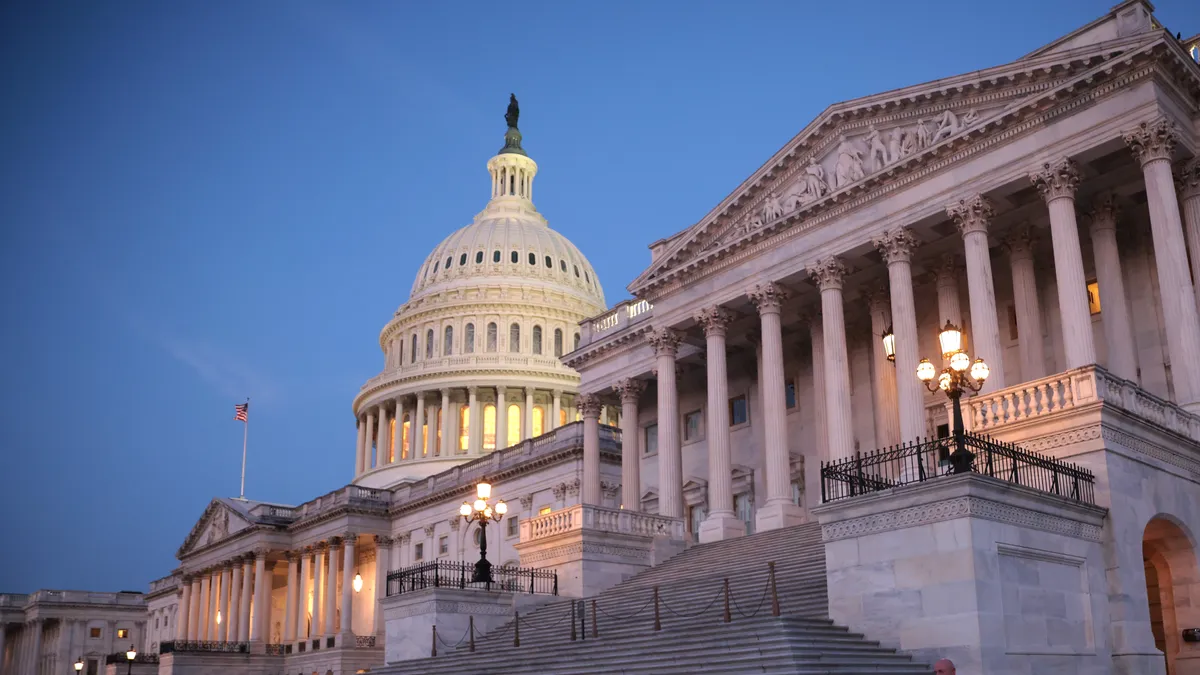Sen. Bob Menendez, D-NJ, resigned Tuesday, effective Aug. 20.
The move comes one week after a jury convicted Menendez on 16 counts, including bribery, fraud, obstruction of justice and acting as a foreign agent.
The jury found Menendez and his wife received gold bars, cash and a Mercedes-Benz convertible in return for favors to three businessmen, including steering billions of dollars in U.S. aid to Egypt.
Menendez serves on the Senate Banking Committee, which – in the months before November’s presidential election and a potential shift in power at the White House in January – stands to address at least two potentially thorny issues.
The first is the pending change in power at the Federal Deposit Insurance Corp. The agency’s current chair, Martin Gruenberg, agreed in May to resign once his successor is approved by the full Senate. And President Joe Biden’s nominee to lead the FDIC, Christy Goldsmith Romero, appeared poised to ascend to that post after a Senate Banking Committee hearing this month.
Sen. Sherrod Brown, D-OH, the chair of the banking panel, is planning for the committee to vote on Goldsmith Romero’s nomination as soon as Thursday, people familiar with the matter told Bloomberg. That would get the vote out of committee before Menendez leaves.
Menendez’s absence wouldn’t create an issue, though. Democrats outnumber Republicans on the Senate Banking Committee, 12 to 11. So even if each senator votes along party lines, Goldsmith Romero’s nomination can advance to the full Senate through a motion by Majority Leader Chuck Schumer, D-NY.
Democrats followed the same procedure when there was a 12-12 party split on then-Federal Reserve Board nominee Lisa Cook in 2022.
Goldsmith Romero could be a key figure, too, in the second time-sensitive hurdle that Democrats, generally, are looking to jump before Biden’s presidency is up. That’s the contentious proposal, led by the Fed, to raise capital requirements at the U.S.’s largest banks by 19%. That proposal is currently being rewritten — but needs sign-off from the FDIC and the Office of the Comptroller and the Currency.
There are however, two deadlines to mind: One is the 60-day period during which the Senate or House could seek to rescind the regulators’ final rule via the Congressional Review Act. (So any final rule would have to be enacted more than 60 days before the next Congress starts at the beginning of 2025.) The wild card, however, is how long the public comment period attached to the capital requirements rule will be. If it’s 60 days, a new capital requirements proposal will have to debut by the end of August at the latest.
To bring it back to Menendez, it’s likely that the Senate Banking Committee will maintain its 11-11 split after Aug. 20 and until another Democrat takes a seat on the committee. That panel carries prestige, though, so it may take time to fill. It’s unlikely that the lawmaker New Jersey Gov. Phil Murphy, a Democrat, taps to fill Menendez’s seat will also take his place on Senate Banking.
But the committee could see more turnover in January if Donald Trump is re-elected. That’s because the Republican nominee for vice president, Sen. J.D. Vance, R-OH, also sits on Senate Banking.
For now, though, moves to put a new figurehead atop the FDIC and duke it out over capital requirements won’t be affected by Menendez’s departure. Even if Menendez’s Senate seat is not filled immediately, Democrats will still hold a 50-49 (caucusing) majority after Aug. 20.
Looking at it from a numbers perspective — and not a criminal conviction one — it stands to reason that Brown, the Senate banking panel chair, was one of the first senators to recommend Menendez resign. Democrats would have had the upper hand in both the chamber and the committee without him.













